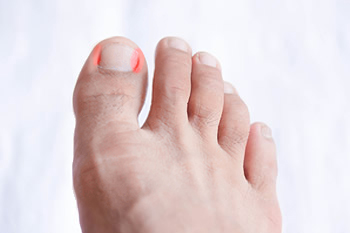
Recognizing an ingrown toenail can be tricky. One symptom many people ignore is the redness surrounding the big toe, which is often the first indication that an ingrown toenail has developed. Severe pain often follows, and the ingrown toenail can become infected. At this point, a podiatrist who can effectively treat this foot condition should be consulted. An ingrown toenail is defined as a nail that grows into the skin instead of over it. It may result from improperly trimming the toenails, sustaining a toe injury, or wearing shoes that are too tight. For mild cases, the foot may feel better when it is soaked in warm water. This may temporarily provide relief, but it may become worse if medical attention is not sought. If you have developed an ingrown toenail, it is strongly advised that you consult a podiatrist who can treat this condition.
Ingrown toenails can become painful if they are not treated properly. For more information about ingrown toenails, contact one of our podiatrist of North Texas Podiatry Associates. Our doctors can provide the care you need to keep you pain-free and on your feet.
Ingrown Toenails
Ingrown toenails occur when a toenail grows sideways into the bed of the nail, causing pain, swelling, and possibly infection.
Causes
- Bacterial infections
- Improper nail cutting such as cutting it too short or not straight across
- Trauma to the toe, such as stubbing, which causes the nail to grow back irregularly
- Ill-fitting shoes that bunch the toes too close together
- Genetic predisposition
Prevention
Because ingrown toenails are not something found outside of shoe-wearing cultures, going barefoot as often as possible will decrease the likeliness of developing ingrown toenails. Wearing proper fitting shoes and using proper cutting techniques will also help decrease your risk of developing ingrown toenails.
Treatment
Ingrown toenails are a very treatable foot condition. In minor cases, soaking the affected area in salt or antibacterial soaps will not only help with the ingrown nail itself, but also help prevent any infections from occurring. In more severe cases, surgery is an option. In either case, speaking to your podiatrist about this condition will help you get a better understanding of specific treatment options that are right for you.
If you have any questions please feel free to contact our offices located in Euless and Southlake, TX . We offer the newest diagnostic and treatment technologies for all your foot and ankle needs.
